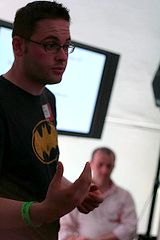So, it’s all over. 2gether08, Steve Moore‘s vision of getting good people from the media, government, third sector, social entrepreneurs and the world of webbies together, was a fantastic couple of days in the (mostly) sunshine. There is so much to talk about, and loads going round in my head.
First up, my session. We had 45 minutes to run the social media game. It kind of worked.
 The room split into two groups, one looking at Tracey‘s issue of creating an online umbrella community for local low carbom networks, and one looking at supporting respite carers online. Each team produced a set of specifications, which were then passed to the other team to act as ‘consultants’ – picking out the tools which could be used to meet the challenge.
The room split into two groups, one looking at Tracey‘s issue of creating an online umbrella community for local low carbom networks, and one looking at supporting respite carers online. Each team produced a set of specifications, which were then passed to the other team to act as ‘consultants’ – picking out the tools which could be used to meet the challenge.
Big shouts to Lloyd Davis, Tim Davies (I think I got the surname spelling the right way round…), Matt Waring, Mitch Sava and Paul Henderson for their help in guiding the n00bs around what some of this stuff actually does.
One of the cool parts of the game is that not all the tools are techie, and it was soon picked out by both groups that a blended approach of on and offline is required for a successful social web strategy. Pretty much every organisation could benefit from taking the time to play games to figure this stuff out. I’m planning on making the leap into self-employment in the very near future, and I’d like to develop the game, and others like it, into ways of showing organisations that planning can be made fun, and that meetings don’t have to be boring.
[HTML1]
I also handed out a load of paper, which seemed to go down well. Tim’s social media primers were very popular, as was Paul Caplan’s Social Media Guide, and Colin McKay’s marvellous Secret Underground Guide to Social Media for Organisations.
Hopefully everyone enjoyed the session, and big thanks to everyone that joined in. I’m absolutely convinced that for events, conferences or whatever, doing fun stuff is more important that sitting and listening to people on stages.
Of course the real value of any event of this kind is in the network, which means hanging around during breaks, and while you should be in session, meeting new folk and chatting to old friends. I made a tonne of great new connections and have a wallet full of moo cards to prove it.
As Lloyd says, though, at some point the talking has to stop and the doing has to start:
I feel it physically. It’s painful. I think sometimes it’s the thing that winds me up most about events – the raising of potential and the lack of resolution. I know I’m going to feel it again tomorrow. The only answer I have by the way is something Umair Haque said this morning: “Organise something” Y’know like “just do it” but no, really do it.
Amen to that.
